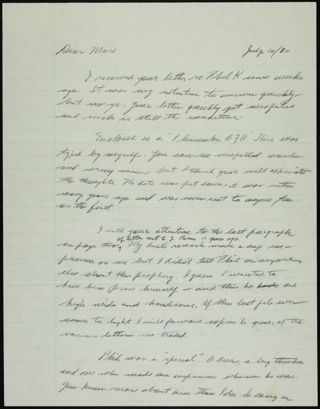From collection Person List

Philip Klutznick was many things in his life: a visionary builder, a diplomat, a philanthropist, and a civic leader.
Klutznick took on his first leadership role in Aleph Zadik Aleph (AZA), when he helped charter the second AZA chapter, Greater Kansas City, in 1924. The following year, as the organization expanded, he was elected to be the second Grand Aleph Godol.
Klutznick graduated from Creighton University with a law degree and embarked on a career in construction. He helped build homes for defense workers during World War II and later partnered with Marshall Field & Company to build department stores. His business success allowed him to work in civil service. Klutznick served every President of the United States from Franklin D. Roosevelt to Jimmy Carter. His three-month term as a United Nations delegate eventually led him to the rank of Ambassador on the UN Economic and Social Council in 1960. In 1980, President Jimmy Carter selected Klutnick to serve as the U.S. Secretary of Commerce, in part for his role in the Arab-Israeli peace talks.
Klutznick’s continued involvement with B’nai B’rith included two three-year terms as president. During his service, he oversaw the organization's worldwide growth. He worked to strengthen lodges in post-war Europe and Israel, advocating that German reparations should fund Jewish organizations. His deep roots in AZA and involvement in the American federal government made a profound difference for BBYO and the Jewish community at large.
He also served as president of the World Jewish Congress, chairman of the Public Affairs Committee of the United Jewish Fund, and president of the Chicago Bulls basketball team.
Klutnick died of Alzheimer’s disease on August 14, 1999.
Related Items

Mike Freeman to Max F. Baer Letter, July 10, 1980
Mike Freeman writes to Max Baer with his reflections on Philip Klutznick and encloses a copy of an earlier letter from Freeman to Julius Bisno with his memories of AZA and an essay titled "I Remember AZA." The letter and the essay are also…
Mike Freeman to Julius Bisno Letter 2, October 6, 1969
Mike Freeman writes to AZA Executive Director Julius Bisno with his memories of the early history of AZA and the founding of AZA's first chapters.
Philip M. Klutznick to Hy Wohlberg Letter, November 22, 1927
Philip M. Klutznick informs Aleph Wolberg of his appointment AZA Midwestern Region Zone #1 Junior Zone Deputy under District Deputy Nathan Mnookin and his duties to report on the status of Kansas City AZA #2, Nordaunian AZA #22, and St. Jo…
AZA Trains Leaders Pamphlet, c. 1954
This pamphlet, published on occasion of the 30th anniversary of the founding of Aleph Zadik Aleph, presents photographs and profiles of outstanding AZA alumni. The pamphlet is dedicated to Philip M. Klutznick.
Philip M. Klutznick to Dr. Boris D. Bogen Letter, December 21, 1927
Philip M. Klutznick, AZA Executive Secretary, advises Dr. Boris D. Bogen that he will write to Dr. Emanuel Gamoran to discuss the AZA ritual.
Julius Bisno to Max Baer Letter 2
Julius Bisno encloses photographs of Ethel Klutznick holding Richard Klutznick shortly before his death from strep throat and instructs him to deposit them in the archives without showing them to Philip and Ethel Klutznick. The photographs…
Philip M. Klutznick to Alan E. Freedman Letter, June 18, 1984
Philip M. Klutznick responds to Alan E. Freedman's article on AZA's founding in The Shofar's 60th anniversary issue with his recollections of AZA's founding, including comments on Julius Bisno, Sam Beber, Nathan Mnookin, Charles Shane, and…
Philip M. Klutznick to Bruno Aron Letter, May 29, 1946
Philip M. Klutznick responds to Bruno Aron on the topic of Dr. Sachar and Kutznick's Norfolk resolution.



